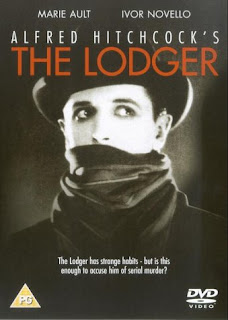Saturday, July 20, 2013
LODGER, THE
(June 1928, U.S.)
To reflect on the great work of Alfred Hitchcock is to traditionally consider his great works of films like PSYCHO, THE BIRDS, VERTIGO, REAR WINDOW and NORTH BY NORTHWEST, to just name some. To reflect even further, one might consider his great early British works of films like THE 39 STEPS, THE LADY VANISHES and SABOTAGE, to just name some. So what's my point? My point is that I suspect that even the most die hard Hitchcock aficionados don't always take the time to consider that the man started out in silent films just like many of the other classic directors of the day. I must confess, though, despite this small bit of preaching, THE LODGER is the only silent Hitchcock film I've ever seen. Shame on me!
This film tells the story of the hunt for a "Jack the Ripper" type of serial killer in London. As the fair-haired female victims of a killer who calls himself "the Avenger" are increasing, the city is on alert and women are taking precaution my wearing dark colored wigs to protect themselves (fifty years later in real life, New York City women would do the same thing during the "Son of Sam" scare of 1977). Meanwhile, late one foggy night, at the lodging home Mr. and Mrs. Bunting, a new tenant, a lodger (played by Ivor Novello) arrives at their house inquires about the room they're renting. Mrs. Bunting takes him to the room on the top floor of her house which is decorated with portraits of beautiful young women, all blondes, which make him uneasy. The man is rather reclusive and secretive, which immediately puzzles Mrs. Bunting. However she doesn't complain after he willingly pays her a month's rent in advance and asks only to be left in peace. From the audience's perspective, we're very likely to just presume that this mysterious man of the night is the serial killer that is terrorizing London. The lodger begins to develop a romantic relationship with Daisy (played by an actress simply called June), a blonde model, daughter of Mr. and Mrs. Bunting and also the love interest of the policeman heading the search for "the Avenger". It's just all so "convenient", ain't it??
Murders continue and the police slowly deduce that the pattern of attacks is working its way towards the Bunting neighborhood. Suspicions slowly arise and actively work their way toward concerned citizen believing that the lodger is the wanted killer. As previously mentioned, we are immediately conditioned to believe that this is so and mounting evidence supports this case. But as in any murder mystery, one of key rules, if not THE key rule, is that the person you suspect the most throughout the film will very likely turn out to be the innocent one by the end. Hitchcock clearly understood that fact and ignore it here. With warrant in hand, law arrive to search the lodger's room. In the locked cupboard they find a leather bag containing a gun, a map plotting the location of the Avenger's murders, newspapers and a photograph of an attractive blonde woman. Taking the lodger's emotional reaction as an admission of guilt, the police surmise that this woman was "the Avenger's" first victim. The lodger is arrested despite Daisy's protests, but manages to escape and runs off into the night. Daisy follows and finds him, still handcuffed, coatless, and shivering in the fog. The lodger explains that the photograph found in his room was his sister, a beautiful debutante who was murdered by "the Avenger" at a dance she had attended with her brother. He vowed to his mother on her deathbed he would not rest until he had brought the killer to justice. By the film's conclusion, a virtual lynch mob is after the lodger until it's revealed that the real "Avenger" has been captured. Justice is served, the innocent is exonerated and love (presumably) has conquered all.
This was one of the first times Hitchcock revealed his psychological attraction to the association between sex and murder, between ecstasy and death. This is a theme that would pave the way for much of his later work. THE LODGER also introduced the theme of the innocent man on the run, hunted down by a self-righteous society, and a fetishistic sexuality, another trademark of his later films. Hitchcock shows us ominous camera angles and claustrophobic lighting that help create the perfect mood of a murder mystery in the heart of the London fog.
I have to say that I've watched this film a few times and every time it's rather difficult to watch all the way through. Not because it's not a worthwhile film. It's because it's a very old and grainy public domain print and when you're watching it late at night in the dark, that sort of black and white picture plays hell with your eyes and makes you sleepy. It happens to me, anyway.
Favorite line or dialogue:
The Lodger: "I know it looks ugly, but they got on my nerves."
(Sounds like my feelings for many of the people I encounter in my everyday life!)
Subscribe to:
Post Comments (Atom)



No comments:
Post a Comment